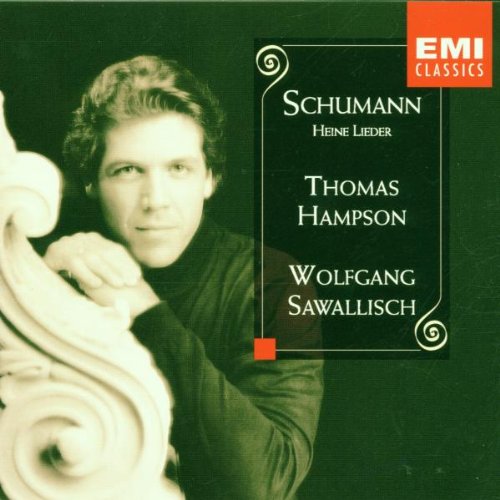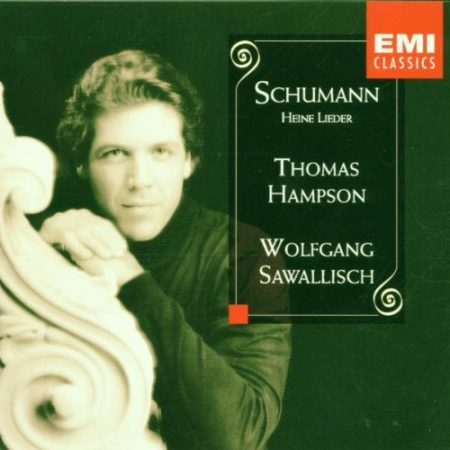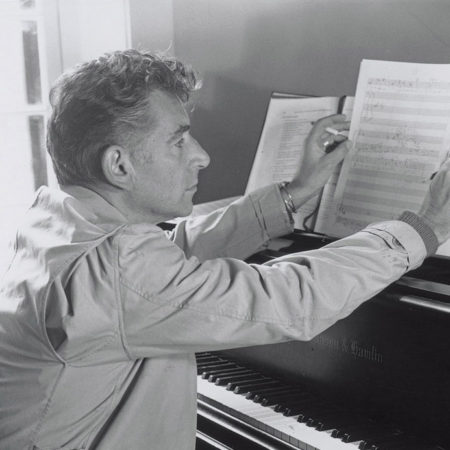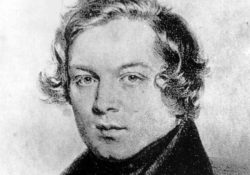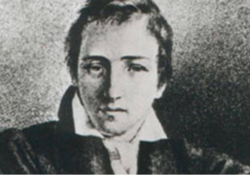Robert Schumann: 20 Lieder und Gesänge…
Original manuscript version of Dichterliebe, 1840
Song Cycle by Robert Schumann (1810-1856)
Text by Heinrich Heine (1797-1856)
Translation © 1997, Thomas Hampson and Carla Maria Verdino-Süllwold
Note: Brackets indicate where Schumann altered Heine’s original text.
Song List
I. Im wunderschönen Monat Mai
II. Aus meinen Tränen sprießen
III. Die Rose, die Lilie
IV. Wenn ich deine Augen seh’
V. Dein Angesicht
VI. Lehn’ deine Wang’
VII. Ich will meine Seele tauchen
VIII. Im Rhein, im heiligen Strome
IX. Ich grolle nicht
X. Und wüßten’s die Blumen, die kleinen
XI. Das ist ein Flöten und Geigen
XII. Hör’ ich das Liedchen klingen
XIII. Ein Jüngling liebt ein Mädchen
XIV. Am leuchtenden Sommermorgen
XV. Es leuchtet meine Liebe
XVI. Mein Wagen rollet langsam
XVII. Ich hab’ im Traum geweinet
XVIII. Allnächtlich im Traume
XIX. Aus alten Märchen winkt es
XX. Die alten, bösen Lieder
File Download
Translation © 1997, Thomas Hampson and Carla Maria Verdino-Süllwold
Dichterliebe-1840 (pdf / 63.49 KB)I.
Als alle Knospen sprangen,
Da ist in meinem Herzen
Die Liebe aufgegangen.
Im wunderschönen Monat Mai,
Als alle Vögel sangen,
Da hab’ ich ihr gestanden
Mein Sehnen und Verlangen.
When all the buds were blooming,
Then in my heart
Did love well up.
In the lovely month of May,
When all the birds were singing,
Then did I to her confess
My longing and desire.
II.
Viel blühende Blumen hervor,
Und meine Seufzer werden
Ein Nachtigallenchor.
Und wenn du mich lieb hast, Kindchen,
Schenk’ ich dir die Blumen all’,
Und vor deinem Fenster soll klingen
Das Lied der Nachtigall.
many a flower in bloom,
and my sighs become
a choir of nightingales.
And if you love me, little one,
I will give you all the flowers,
and at your window shall sound
the song of the nightingale.
III.
Die liebt’ ich einst alle in Liebeswonne.
Ich lieb’ sie nicht mehr, ich liebe alleine
Die Kleine, die Feine, die Reine, die Eine;
Sie selber, aller Liebe [Bronne,]
Ist Rose und Lilie und Taube und Sonne.
[Ich liebe alleine
Die Kleine, die Feine, die Reine, die Eine.]
I once loved them all with wondrous bliss.
I love them no longer, I love only
my tiny, fine, pure, rare darling;
she herself is [the fountain] of all love,
she is rose and lily and dove and sun.
[I love only
my tiny, fine, pure, rare darling.]
IV.
So schwindet all’ mein Leid und Weh;
Doch wenn ich küße deinen Mund,
So werd’ ich ganz und gar gesund.
Wenn ich mich lehn’ an deine Brust,
Kommt’s über mich wie Himmelslust;
Doch wenn du sprichst: ich liebe dich!
So muß ich weinen bitterlich.
all my pain and sorrow vanish;
but when I kiss your lips,
the I become whole and healthy.
When I lay myself on your breast,
heavenly bliss envelops me;
but when you say “I love you!”
Then I can only weep bitterly.
V.
Das hab’ ich jüngst im Traum geseh’n;
Es ist so mild und engelgleich,
Und doch so bleich und schmerzensreich.
Und nur die Lippen, die sind rot;
Bald aber küßt sie bleich der Tod;
Erlöschen wird das Himmelslicht,
Das aus den frommen Augen bricht.
I saw lately in a dream;
it is so mild and angelic
and yet so pale and full of pain.
Only your lips are red,
but Death will soon kiss them pale.
The heavenly light that shines
from your gentle eyes will be extinguished.
VI.
Dann fliessen die Tränen zusammen;
Und an mein Herz drück fest dein Herz,
Dann schlagen zusammen die Flammen!
Und wenn in die große Flamme fliesst
Der Strom von unsern Tränen,
Und wenn dich mein Arm gewaltig umschließt –
Sterb’ ich vor Liebessehnen!
then our tears will flow together;
and press your heart close to my heart,
then their flames will turn together.
And when into that great flame
flows the stream of our tears,
and when my arms hold you tight—
I shall die of love’s yearning!
VII.
In den Kelch der Lilie hinein;
Die Lilie soll klingend hauchen
Ein Lied von der Liebsten mein.
Das Lied soll schauern und beben
Wie der Kuß von ihrem Mund,
Den sie mir einst gegeben
In wunderbar süßer Stund’.
into the cup of the lily;
the lily would breathe melodiously
a song of my beloved.
The song would shiver and tremble
like the kiss from her lips
which she once gave me
in a wonderfully sweet hour.
VIII.
Da spiegelt sich in den Well’n
Mit seinem großen Dome
Das große, heilige Köln.
Im Dom da steht ein Bildnis,
Auf goldnem Leder gemalt;
In meines Lebens Wildnis
Hat’s freundlich hineingestrahlt.
Es schweben Blumen und Eng’lein
Um unsre liebe Frau;
Die Augen, die Lippen, die Wänglein,
Die gleichen der Liebsten genau.
is mirrored in the waves,
with its towering cathedral
the holy city of Cologne.
In the cathedral there is a picture,
painted on golden leather;
into the wilderness of my life
it shone with friendly radiance.
Flowers and little angels float
around our blessed Lady;
her eyes, her lips, her cheeks,
are just like those of my beloved.
IX.
Ewig verlornes Lieb! ich grolle nicht.
Wie du auch strahlst in Diamantenpracht,
Es fällt kein Strahl in deines Herzens Nacht.
Daß weiß ich längst. Ich sah dich ja im Traume,
Und sah die Nacht in deines Herzens Raume,
Und sah die Schlang, die dir am Herzen frißt,
Ich sah, mein Lieb, wie sehr du elend bist.
[Ich grolle nicht, ich grolle nicht.]
Forever lost, o love! I will not complain.
However you may shine in bediamonded splendour,
No ray illuminates the night in your heart.
Long have I known this. Yes, I saw you in a dream,
And saw the night in the abyss of your heart,
And saw the serpent that gnaws at your breast,
I saw, my love, how miserable you are.
[I will not complain, I will not complain!]
X.
Wie tief verwundet mein Herz,
Sie würden mit mir weinen,
Zu heilen meinen Schmerz.
Und wüßten’s die Nachtigallen,
Wie ich so traurig und krank,
Sie ließen fröhlich erschallen
Erquickenden Gesang.
Und wüßten sie mein Wehe,
Die goldnen Sternelein,
Sie kämen aus ihrer Höhe,
Und sprächen Trost mir ein.
Die alle können’s nicht wissen,
Nur eine kennt meinen Schmerz;
Sie hat ja selbst zerrissen,
Zerrissen mir das Herz.
how deeply wounded my heart is,
they would cry with me,
to heal my sorrow.
And if the nightingale knew,
how sad and sick I am,
they would gladly release a torrent
of restorative sound.
And if they knew my pain,
the little golden stars,
would come down from heaven,
to give me comfort.
But all of them cannot know,
one alone understands my suffereing,
it is she who has rent,
rent my heart.
XI.
Trompeten schmettern d’rein;
Da tanzt wohl den Hochzeitreigen
Die Herzallerliebste mein.
Das ist ein Klingen und Dröhnen,
Von Pauken und Schalmein;
Dazwischen schluchzen und stöhnen
Die [guten] Engelein.
trumpets blaring shrilly;
there dancing the wedding dance,
is my own dearly beloved.
There is a ringing and roaring,
the sound of a drum and the sound of shame;
between the sobs and moans
of the [good] little angels.
XII.
Das einst die Liebste sang,
So will mir die Brust zerspringen
Vor wildem Schmerzendrang.
Es treibt mich ein dunkles Sehnen
Hinauf zur Waldeshöh’,
Dort löst sich auf in Tränen
Mein übergroßes Weh’.
that once my dearest sang,
then my breast wants to burst
from a wild surge of pain.
A dark longing drives me
out onto the forest peaks,
there I find relief in tears for
my overwhelming grief.
XIII.
Die hat einen andern erwählt;
Der andre liebt eine andre,
Und hat sich mit dieser vermählt.
Das Mädchen heiratet aus Ärger
Den ersten besten Mann,
Der ihr in den Weg gelaufen;
Der Jüngling ist übel dran.
Es ist eine alte Geschichte,
Doch bleibt sie immer neu;
Und wem sie just passieret,
Dem bricht das Herz entzwei.
And she has chosen another;
he, in turn, loves another
and marries her.
The maiden in her anger
marries the next best man
who comes her way;
the youth takes it badly.
It is an old story,
yet it remains every new;
and to whomever it happens,
his heart is rent in two.
XIV.
Geh’ ich im Garten herum.
Es flüstern und sprechen die Blumen,
Ich aber wandle stumm.
Es flüstern und sprechen die Blumen,
Und schau’n mitleidig mich an:
„Sei unserer Schwester nicht böse,
Du trauriger blasser Mann.“
I walk about in the garden.
The flowers whisper and speak,
but I wander silently.
The flowers whisper and speak,
and look at me with pity;
“Do not be angry with our sister,
you sad, pale man.”
XV.
In ihrer dunkeln Pracht,
Wie’n Märchen traurig und trübe,
Erzählt in der Sommernacht.
„Im Zaubergarten wallen
Zwei Buhlen, stumm und allein;
Es singen die Nachtigallen,
Es flimmert der Mondenschein.
„Die Jungfrau steht still wie ein Bildnis,
Der Ritter vor ihr kniet.
Da kommt der Riese der Wildnis,
Die bange Jungfrau flieht.
„Der Ritter sinkt blutend zur Erde,
Es stolpert der Riese nach Haus…”
Wenn ich begraben werde,
Dann ist das Märchen aus.
in its dark splendour
like a sad, somber tale
told on a summer night.
“In the magic garden wander
two lovers, silent and alone;
the nightingales are singing,
the moonlight glimmers.
“The maid stands still as a statue,
the knight kneels before her.
Then comes the giant of the wasteland,
and the maiden flees in terror.
“The knight sinks bleeding to the ground,
the giant lurches back home…”
When I am in my grave
The story will be done.
XVI.
Durch lustiges Waldesgrün,
Durch blumige Taler,
Die zaubrisch im Sonnenglanze blühn.
Ich sitze und sinne und träume,
Und denk’ an die Liebste mein;
Da grüßen drei Schattengestalten
Kopfnickend zum Wagen herein.
Sie hüpfen und schneiden Gesichter,
So spöttisch und doch so scheu,
Und quirlen wie Nebel zusammen,
Und kichern und huschen vorbei.
through cheerful green woods,
through flowery valleys that bloom
magically in the sunshine.
I sit and ponder and dream
and think of my true love:
three shadowy figures greet me,
nodding their heads at the carriage.
They caper and grimace,
so mocking yet so timid,
whirl together like mist
and whisk by, gibbering.
XVII.
Mir träumte du lägest im Grab.
Ich wachte auf, und die Träne
Floß noch von der Wange herab.
Ich hab’ im Traum geweinet,
Mir träumt’, du verließest mich.
Ich wachte auf, und ich weinte
Noch lange bitterlich.
Ich hab’ im Traum geweinet,
Mir träumte, du wär’st mir noch gut.
Ich wachte auf, und noch immer
Strömt meine Tränenflut.
I dreamed you lay in your grave.
I woke, and the tears
still flowed from my cheeks.
I wept in my dream,
I dreamed you left me.
I woke and I continued to cry
bitterly for a long time.
I wept in my dream,
I dreamed you were still mine.
I woke and my tears still
flowed unceasingly.
XVIII.
Und sehe dich freundlich grüßen,
Und laut aufweinend stürz’ ich mich
Zu deinen süßen Füßen.
Du siehst mich an wehmütiglich
Und schüttelst das blonde Köpfchen;
Aus deinen Augen schleichen sich
Die Perlentränentröpfchen.
Du sagst mir heimlich ein leises Wort
Und gibst mir den Strauß von Cypressen.
Ich wache auf, und der Strauß ist fort,
Und das Wort hab’ ich vergessen.
and see you giving me a friendly greeting
and sobbing aloud, I throw myself
at your feet.
You look at me with pity,
and shake your little blonde head;
from your eye silently
steal pearly little teardrops.
You secretly whisper a gentle word,
and give me a cypress bouquet.
I wake and the cypress is gone.
And I have forgotten what you said.
XIX.
Hervor mit weißer Hand,
Da singt es und da klingt es
Von einem Zauberland;
Wo bunte Blumen blühen
Im goldnen Abendlicht,
Und lieblich duftend glühen,
Mit bräutlichem Gesicht;
[Und grüne Bäume singen
Uralte Melodei’n,
Die Lüfte heimlich klingen,
Und Vögel schmettern drein;
Und Nebelbilder steigen
Wohl aus der Erd’ hervor,
Und tanzen luft’gen Reigen
Im wunderlichen Chor;
Und blaue Funken brennen
An jedem Blatt und Reis,
Und rote Lichter rennen
Im irren, wirren Kreis;
Und laute Quellen brechen
Aus wildem Marmorstein.
Und seltsam in den Bächen
Strahlt fort der Widerschein.]
Ach, könnt’ ich dorthin kommen,
Und dort mein Herz erfreu’n,
Und aller Qual entnommen,
Und frei und selig sein!
Ach! jenes Land der Wonne,
Das seh’ ich oft im Traum,
Doch kommt die Morgensonne,
Zerfließt’s wie eitel Schaum.
beckons a white hand,
there is singing and the sounds
of a magic land;
Where colorful flowers grow,
in golden evening light,
and in the lovely fragrance glow
with the radiant face of a bride;
[And green trees sing
their ageold melodies,
the breezes whisper secretively,
and the birds warble there;
And misty shapes rise up
right out of the earth,
and dance airy dances
in a marvelous strange chorus;
And blue sparks burn
on every leaf and twig,
and red lights swirl
in a crazy, confused circle;
And noisy springs gush
from the wild marble rocks,
and in the brook’s strange
reflections flicker back and forth;]
Ah, if I could go there,
and let my heart rejoice,
and there be relieved of all pain,
and be free and happy!
Ah, that land of bliss,
I have often seen in dreams;
but with the morning’s sunrise,
it vanishes like mist.
XX.
Die Träume schlimm und arg,
Die laßt uns jetzt begraben,
Holt einen großen Sarg.
Hinein leg’ ich gar manches,
Doch sag’ ich noch nicht, was;
Der Sarg muß sein noch größer,
Wie’s Heidelberger Faß.
Und holt eine Totenbahre,
Von Brettern fest und dick;
Auch muß sie sein noch länger,
Als wie zu Mainz die Brück’.
Und holt mir auch zwölf Riesen,
Die müssen noch stärker sein
Als wie der heil’ge Christoph
Im Dom zu Köln am Rhein.
Die sollen den Sarg forttragen,
Und senken ins Meer hinab;
Denn solchem großen Sarge
Gebührt ein großes Grab.
Wißt ihr, warum der Sarg wohl
So groß und schwer mag sein?
Ich legt’ auch meine Liebe
Und meinen Schmerz hinein.
the nasty grim dreams,
let us now bury them;
come, fetch a large coffin.
Therein shall I lay many a thing,
but I will not yet say what;
the coffin must be even larger,
than Heidelberg’s huge vat.
Bring me a bier
and firm, thick planks;
it must be even longer,
than the bridge over the Mainz.
Then fetch me twelve giants,
they must be stronger
than the strong St. Christopher
in the cathedral of Kîln on the Rhine.
They must carry away the coffin
and sink it deep in the sea;
because such a large casket
needs a deep grave.
Do you know why the coffin
must be so big and heavy?
Because I am also burying in it
my love and pain.
Schumann: Heine Lieder
Thomas Hampson, baritone
Wolfgang Sawallisch, piano
Recorded: 1994 / Album Release: 1997
EMI Classics: CDC55598
